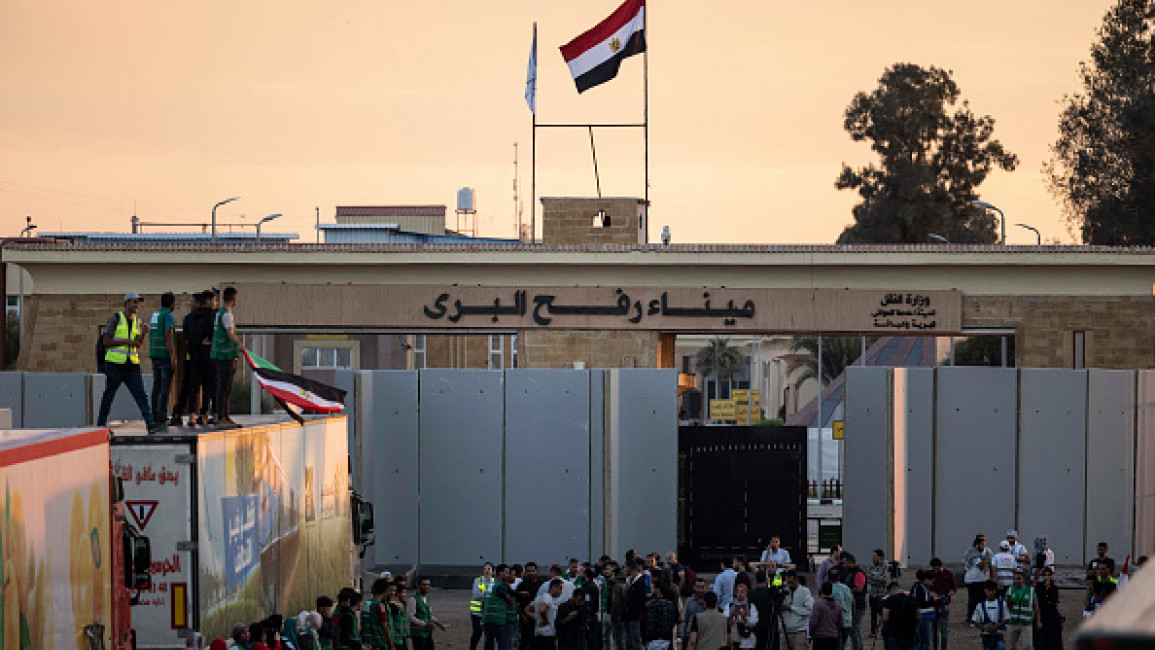Egypt's Rafah border crossing with Gaza remains closed amid unmet vows by world leaders
Egypt's Rafah border crossing in the once restive northeastern North Sinai province remains closed until at least Friday, 20 October, with no clear indication when it will open for relief efforts and aid to be delivered to the distressed Palestinians of the Gaza Strip experiencing a brutal war by Israel.
Meanwhile, hundreds of North Sinai activists and residents began an open sit-in on the Egyptian side of the crossing, already spending nights in tents for the third consecutive day, and they vow to stay there until Palestinians in Gaza have access to basic needs.
Egypt shut down the Rafah border crossing with Gaza until further notice on 10 October after Israeli air strikes hit the Palestinian side of the crossing. The crossing has been bombarded several times by Israeli airstrikes, the last on 16 October, inflicting damages to the structure of the Egyptian side.
The Rafah border crossing is the only connection of the Gaza Strip to the outside world.
Unmet vows
The campers, many of them students at universities based in North Sinai province, as well as relief workers and truck drivers carrying aid supplies, adopted the slogan, "Camping until aid is delivered", as aid convoys have piled up in Rafah city in North Sinai, waiting for approval to cross into Gaza to provide water, food, supplies, and medicine to thousands of distressed Palestinians on the other side.
"We insist on staying in our tents, and we won't leave before aid convoys reach our community in Gaza," one protester told The New Arab on condition of anonymity.
"It has been 13 days now, and people are dying from the lack of healthcare, running water and other basic life needs, let alone the persistent Israeli strikes," another protester told TNA, who declined to be named.
The young people of Sinai called on world leaders to immediately open the border crossing as soon as possible to allow Egyptian ambulances inside Gaza to carry the wounded to the hospitals in North Sinai and other severe cases to major hospitals in the capital, Cairo, for treatment.
On Thursday, 19 October, thousands of tons of aid supplies sent by several countries worldwide have been waiting to enter Gaza, piling up on the border crossing after US President Joe Biden had an agreement with Egypt and Israel overnight to allow relief in.
On Friday at almost midnight, the Egyptian border authorities removed cement barriers it had previously constructed on the border, which implied that the border would be accessed soon.
It remains unclear, however, by the time of publication when exactly Gazans can access aid and relief efforts through the border with Egypt amid contradictory, unmet official vows.
Displacement theories
Egypt and Israel have technically been at peace since 1978, sharing strong diplomatic and economic relations. But the Egyptian people have long been at loggerheads with the country's successive regimes over normalisation, as many consider Israel a coloniser of Palestine since the 1948 war, an oppressor of the Palestinian people, and a former occupier of the Sinai Peninsula.
The Egyptian government frequently expressed worry against a possible mass exodus of Palestinians forced to choose between death under Israeli bombing or displacement from their land.
Conspiracy theories, adopted since the 1950s, have always implied that Egypt could give up part of North Sinai for Gazans to build a state on.
However, most recently, Egypt's President Abdel Fattah al-Sisi Sisi stirred up controversy following remarks he made during a joint press conference with the German German Chancellor Olaf Scholz in Cairo, Gazans could be moved to the Israeli Negev desert instead: "Until Israel is capable of defeating Hamas and the Islamist Jihad. Afterwards, Palestinians could return to their homeland."
"A displacement to Sinai means moving the attacks against Israel to Egyptian territories, which threatens the peace between Israel and a country of 105 million people [Egypt]," Sisi publically said.
Since 2007, Egypt and Israel have imposed a strict blockade on Gaza after Hamas assumed power following clashes with the rival Fatah faction that rules the occupied West Bank.
It was not until nearly a decade later, when Hamas dropped its affiliation with the Muslim Brotherhood, a legally outlawed group in Egypt since 2014, that the Egyptian regime softened its tone towards the Palestinian faction.



